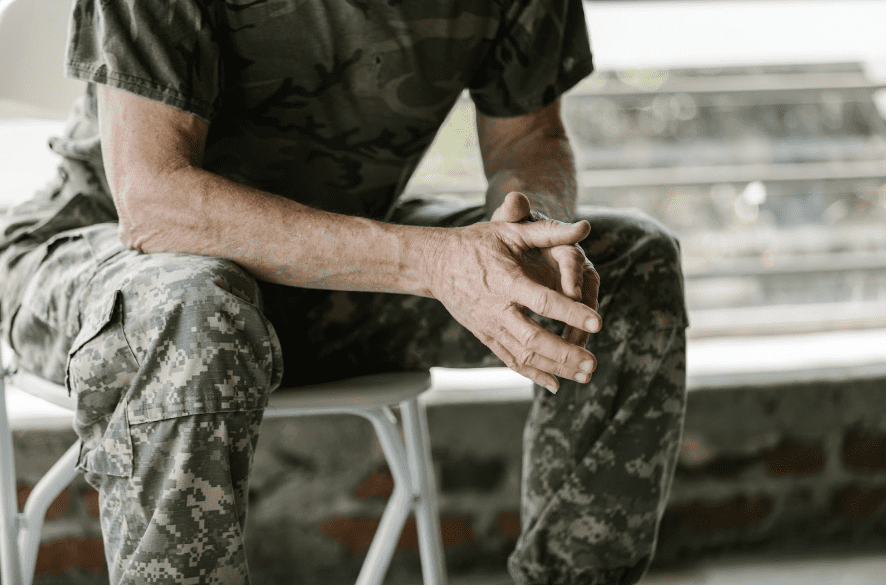By Emily Becher and Emily Krekelberg; adapted by Sara Croymans
What is anticipatory stress?
Anticipatory stress is experiencing an increased stress response in anticipation of a difficult or unpredictable situation. For military families, this might be a PCS (Permanent Change of Station), a pending deployment, or reintegration following deployment. There are three stages of anticipatory stress:
- Becoming aware of a potential threat/challenge
- Evaluating whether we have the resources to meet the potential threat/challenge or if there is potential for us to be overwhelmed
- The physical and emotional experience of stress
What can anticipatory stress look like?
- Increased heart rate
- Feeling tense and on edge
- Racing thoughts
- Rapid breathing or difficulty getting a full breath
- Increased perspiration
- Difficulty sleeping
- Feeling irritable
- Finding it difficult to concentrate
Can anticipatory stress be prevented?
The first thing to know is that not all anticipatory stress is bad. Some research indicates that when people have increased anticipatory stress, they also recover more quickly after the stressful event has happened. This may indicate that while it doesn’t feel pleasant, experiencing some anticipatory stress might be protective for us and helpful for us in coping with stressful events in the long run. In fact, in general, manageable levels of moderate life stress seems to have a positive impact on how humans function at a physiological level. However, ongoing, chronic stress can have a profoundly negative effect on our health and our overall functioning and well-being. Therefore, if the anticipatory stress experienced by the service member or their family members feels unmanageable, it is important to address it. In order to reduce anticipatory stress here are some helpful strategies that could be used with service members or military family members:
Help to reframe and reappraise.
Research indicates that when we can have a more positive appraisal of an oncoming stressful event, both that the stressful event will be less negative than we think and confidence that we will have the resources to meet it, our stress response is reduced. Help the individual identify positive aspects of the pending stressful event.
Encourage the use of compassionate and positive self-talk.
Provide examples, modeling, and opportunities to practice compassionate and positive self-talk for the military families you work with to use when they are thinking about a pending event and about whether they can manage it. Encourage them to tell themselves things like: “I have survived many things, I will survive this too” or “This is going to be hard, but I know I can face this challenge”. It may seem silly but research indicates that having self-compassion and attempting to talk to oneself in a positive way can have real impacts on our stress levels.
Recommend self-care.
People who exercise regularly, eat nutritious meals, get enough sleep, have ways to relax and have fun, and have positive relationships with others can more effectively cope with stress. As service providers working with military families, help them be aware of available resources and opportunities to connect with others.
Suggest using biofeedback.
Biofeedback can be a helpful tool for managing stress and it can even be done without a smartwatch or a fancy device. Try this exercise with the individuals and families you work with:
Find your pulse with your fingers and pay attention to the beats per minute. Or pay attention to your breathing and count your breaths. Use a breathing and visualization technique like the box breath technique:
- Breathe for 4 seconds counting slowly.
- Hold your breath for 4 seconds counting slowly.
- Let the breath out for 4 seconds counting slowly.
After you’ve done this a few times, go back to your pulse and your breathing and compare where your numbers are now to where they were before.
Provide positive social opportunities.
Research indicates that spending time with someone who is struggling with depression can increase our own risk of depression simply because it is easy to get into a negative cycle of conversation. For example, focusing on what can go wrong, personal failures in a situation, etc. Therefore, if an individual is feeling an increased sense of stress, it may be important to be thoughtful about who they are spending time with in order to be protective of their wellbeing. Recommend positive social interactions or provide get-togethers that focus on the positive aspects of life.
What if anticipatory stress feels unmanageable?
As a service provider, help the individual understand that these feelings are normal. Encourage those who are feeling anticipatory stress to talk to a healthcare provider who can discuss their concerns and identify what the next steps might be.
Our OneOp Military Caregiving, Family Development, and Nutrition & Wellness colleagues offer useful blog posts about stress:
- Staying Positive: The Link Between Being Positive & Stress
- Practicing Mindfulness, Meditation, and Self-Care to Combat Stress for Military Families
- Stress: An Issue of Modifiable Lifestyle Factors
In addition, Military OneSource has resources to “Address That Stress”, providing free, confidential help for service members and military families.
References
Aschbacher, K., O’Donovan, A., Wolkowitz, O. M., Dhabhar, F. S., Su, Y., & Epel, E. (2013). Good stress, bad stress and oxidative stress: insights from anticipatory cortisol reactivity. Psychoneuroendocrinology, 38(9), 1698-1708. https://doi.org/10.1016/j.psyneuen.2013.02.004.
Juster, R. P., Perna, A., Marin, M. F., Sindi, S., & Lupien, S. J. (2012). Timing is everything: Anticipatory stress dynamics among cortisol and blood pressure reactivity and recovery in healthy adults. Stress, 15(6), 569-577. https://doi.org/10.3109/10253890.2012.661494.
Luo, X., Qiao, L. & Che, X. Self-compassion Modulates Heart Rate Variability and Negative Affect to Experimentally Induced Stress. Mindfulness 9, 1522–1528 (2018). https://doi.org/10.1007/s12671-018-0900-9.
Pulopulos, M.M., Baeken, C., & Raedt, R. (2020). Cortisol response to stress: The role of expectancy and anticipatory stress regulation. Hormones and Behavior, 117, 1-10. https://doi.org/10.1016/j.yhbeh.2019.104587.
Schlatter, S., Schmidt, L., Lilot, M., Guillot, A., & Debarnot, U. (2021). Implementing biofeedback as a proactive coping strategy: Psychological and physiological effects on anticipatory stress. Behaviour Research and Therapy, 140, 103834. https://doi.org/10.1016/j.brat.2021.103834.
Zalk, M. H. W. V., Kerr, M., Branje, S. J., Stattin, H., & Meeus, W. H. (2010). Peer contagion and adolescent depression: The role of failure anticipation. Journal of Clinical Child & Adolescent Psychology, 39(6), 837-848. https://doi.org/10.1080/15374416.2010.517164.
 Emily Becher is an Applied Research and Evaluation Specialist at the University of Minnesota Extension Center for Family Development. Emily has a background in couple and family therapy and trauma-informed adult education.
Emily Becher is an Applied Research and Evaluation Specialist at the University of Minnesota Extension Center for Family Development. Emily has a background in couple and family therapy and trauma-informed adult education.
 Emily Krekelberg works for University of Minnesota Extension as the Extension Educator for Farm Safety & Health. Her work focuses on grain bin safety, livestock safety, tractor safety, farmer mental health, and suicide prevention. A passion of Emily’s is weaving together the science of production agriculture with the art of building resilience.
Emily Krekelberg works for University of Minnesota Extension as the Extension Educator for Farm Safety & Health. Her work focuses on grain bin safety, livestock safety, tractor safety, farmer mental health, and suicide prevention. A passion of Emily’s is weaving together the science of production agriculture with the art of building resilience.
 Sara Croymans, MEd, AFC, University of Minnesota Extension Educator, member of the OneOp Family Transitions team, military spouse, and mother.
Sara Croymans, MEd, AFC, University of Minnesota Extension Educator, member of the OneOp Family Transitions team, military spouse, and mother.
Photo source: Pexels.com/RODNAE Productions















